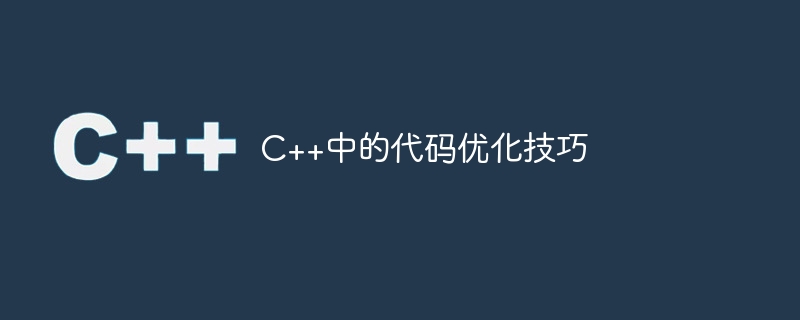

C is a powerful programming language, but its flexible syntax and rich features can sometimes result in slower code execution. To take better advantage of C's performance advantages, programmers can use various code optimization techniques to increase the speed of their programs. Here are some commonly used C code optimization techniques.
Function calls will lead to frequent use of the stack, which will consume a lot of time and memory in the program. Therefore, we should reduce the number of function calls as much as possible. For example, embed a complex piece of code into the main function instead of creating a new function to run this code. Additionally, calling functions within loops should be avoided whenever possible.
Loop expansion is a method of folding loops to reduce program execution time. The idea of loop unrolling is to copy the code within the loop several times so that the loop can be completed in a shorter time. This method can improve the performance of the program to a certain extent, but it will also increase the redundancy of the code and increase the size of the program.
Inline functions are functions that expand function code at each call point. They usually run faster than other functions because they don't have the overhead involved in calling functions. This technique can be used when the function's parameters or return value are small, otherwise the program might slow down.
Code processed by the preprocessor can make the program more effective and efficient. By using preprocessor directives such as #ifndef and #define to avoid duplicate code, and using macro definitions to eliminate extra branches, you can improve the efficiency of your code while maintaining its theme.
Dynamic memory allocation will cause greater overhead in program running. Therefore, reducing the number of dynamic memory allocations can effectively improve program performance. For example, it would be unwise to allocate large amounts of memory in a loop and free it on each iteration. In this case, one possible approach is to allocate a block of memory during the initialization phase of the program and then only use that memory when the memory is needed instead of dynamically allocating the memory.
In short, optimizing code is an issue that programmers must consider when writing efficient C code. Program performance can be effectively improved by techniques such as reducing the number of function calls, loop unrolling, using inline functions, preprocessor optimization, and reducing dynamic memory allocation. Taking these techniques into account, and working closely with the code generated by the compiler, can minimize the execution time of your C code.
The above is the detailed content of Code optimization tips in C++. For more information, please follow other related articles on the PHP Chinese website!
 Introduction to the usage of vbs whole code
Introduction to the usage of vbs whole code
 What are the differences between c++ and c language
What are the differences between c++ and c language
 Recommended learning order for c++ and python
Recommended learning order for c++ and python
 Cost-effectiveness analysis of learning python and c++
Cost-effectiveness analysis of learning python and c++
 Is c language the same as c++?
Is c language the same as c++?
 Which is better to learn first, c language or c++?
Which is better to learn first, c language or c++?
 The difference and connection between c language and c++
The difference and connection between c language and c++
 C++ software Chinese change tutorial
C++ software Chinese change tutorial




